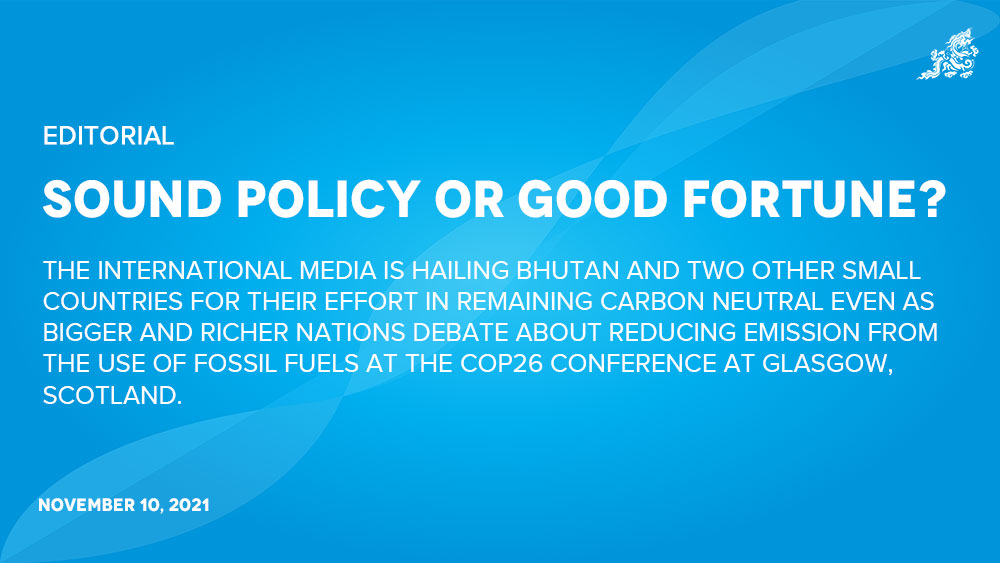The international media is hailing Bhutan and two other small countries for their effort in remaining carbon neutral even as bigger and richer nations debate about reducing emission from the use of fossil fuels at the COP26 conference at Glasgow, Scotland.
Together with Suriname and Panama, a declaration calling for international finance, preferential trade, carbon pricing and other measures to support economies was signed. The three countries have every right to bargain at the high profile climate conference.
Smaller countries, scientific studies and evidence show, are on the receiving end of climate change. Also severely affected are the least developed countries who cannot prepare, mitigate or live with the impact of climate change. As the chair of the LDC group, Bhutan had represented the interest of the LDCs.
A small country and located in a very fragile ecosystem, our actions, notwithstanding the size, will have a small impact on the global effort. We can be a good example, but in the context of global climate change, we need bigger nations to commit. For instance, our giant neighbours, China and India, the biggest and third biggest emitter of carbon have not signed the deal to reduce the use of coal, the number one source of carbon emission.
From the perspective of global climate change, what happens in the region – China and India included – will have a severe impact on smaller nations like ours. Located in the fragile and young Himalayan region, we are one of the first nations to feel the impact of global warming, manifested in the form of increasing landslides, flash floods, erratic rainfall and many more.
Bhutan had remained true to the spirit of the Paris agreement on climate change and the Kyoto Protocol. However, while we pat ourselves on our back for international recognition, we should not be carried away.
What we did in the past can be attributed to the advantage of being a late entrant into the development process and the visionary leadership that had the wisdom to protect the environment. It was, we can surmise, a good fortune to boast about a balanced ecology and the status of a leader in conservation of the natural environment.
The question is whether we are doing enough to keep up the legacy. The pressure is growing to sacrifice aspects of the environment for economic growth. This includes pollution from burning fossil fuel, waste from increasing consumerism and pressure on our forest.
The Constitution mandates the requirement of 60 percent forest coverage for all times to come. There are protected areas and biological corridors. Beyond these, our activities don’t indicate that we are on the right path. Several governments talked promisingly of establishing better public transport – a good solution – but nothing has come through. Since the Paris agreement, we have added more cars on our roads and carbon in the air. Today we have one car for 1.5 Bhutanese and import of fossil fuel cannot offset our export of renewable energy.
Roads are penetrating into virgin forests making logging more feasible and forests vulnerable. With pressure on economic growth and populist decisions to remain in power, the environment interest could be forced to the backstage. After decades of harping on electric vehicles or improved public transport, what we have today is about 200 electric vehicles compared to import of 20 fossil-fuel driven vehicles a day.
We are witnessing more and more severe wildfires in winter. The Thimphu crematorium, the busiest in the country with an electric incinerator, is the highest consumer of fuel wood. There are many examples of how we are not living up to the vision or to the status we have earned. Whatever happened in the past was, as someone said, “our good fortune.” The problem is this good fortune threatens to run out because of our inaction.


